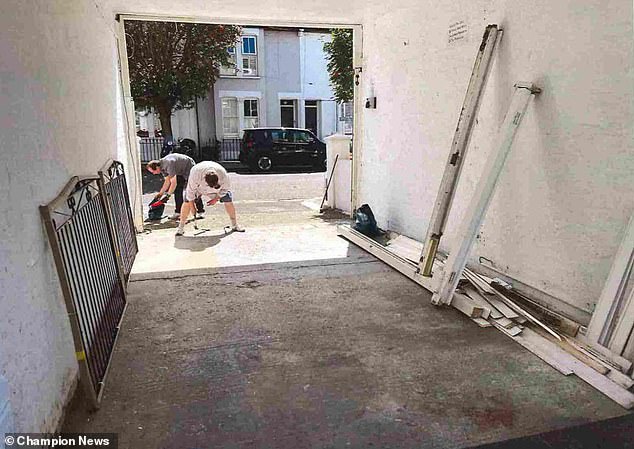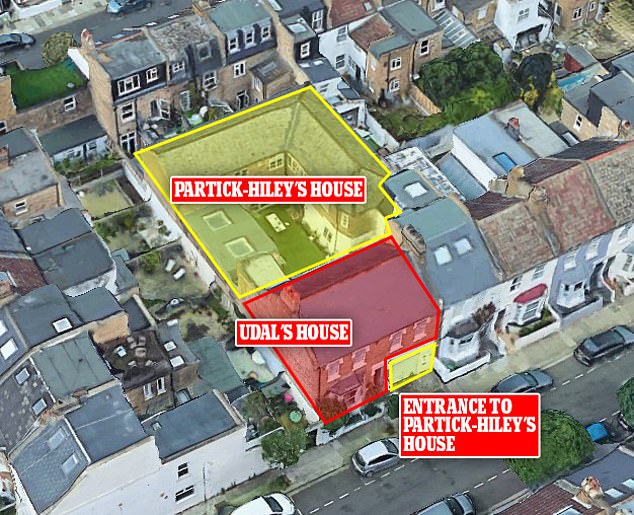Parliament’s master bellringer has been hit with a £100,000-plus court bill after tearing out the front gates of his banker neighbour’s £2m west London home.
Retired financier Nicholas Partick-Hiley bought his mews cottage in Fulham, in August 2023, planning to make the property a dream home for his retirement alongside wife, Lisa.
But the 64-year-old was shocked when he arrived on the day of completion to find his new neighbour bell-ringer neighbour, Adrian Udal, 65, demolishing the door and roller gate securing the front of his home.
Mr Udal, who had lived next door to the couple’s property for 30 years, insisted he had a right to do what he did as he owns the land the gate was on.
However, the couple sued and won the case last month after Judge Nicholas Parfitt branded Mr Udal’s actions ‘wanton destruction’ and ‘carefully pre-planned’.
And now Mr Udal – Secretary of the Belfry at St Margaret’s Church, a medieval building next to Westminster Abbey which acts as place of worship for the Houses of Parliament – has been left facing a £100,000-plus bill after being ordered to pay the legal costs of the case.
In a short hearing at Mayor’s and City County Court, Judge Parfitt ordered him to pay £85,000 up front towards his neighbours’ estimated £100,000-plus legal bill.
He will also have to pay the couple £10,000 compensation for what he did, as well as his own lawyers’ significant costs, which have not been revealed in court.

Adrian Udal, 65, demolished the door and roller gate securing the front of his neighbour’s home

Retired financier Nicholas Partick-Hiley (left) bought his mews cottage in Fulham, in August 2023, planning to make the property a dream home for his retirement alongside wife, Lisa (right)

Pictured: Mr Udal (back) and a helper in the act of destroying his neighbours’ gate
Mr Udal is a veteran bell-ringer, whose Secretary of the Belfy role involves liasing with clergy when bellringing is needed for special church, state and parliamentary events, while he is proud to have ‘rung in’ the New Year almost every year since 2000.
He also works as a broadcast editor and has a keen interest in antique clocks, while his wife, Helen, is also a campanologist, being bell tower captain at St Gabriel’s Church Pimlico.
Mr Partick-Hiley is a retired financier and former managing director and head of sales for North America investment banking specialists Panmure Gordon.
During the trial last month, Judge Parfitt was told how the two neighbouring homes are in an unusual layout, with the Partick-Hileys’ house located behind Mr Udal’s property and reachable across a drive and through a passageway, which passes under part of his house and into their courtyard.
The drive and passageway are owned by Mr Udal, but the Partick-Hileys have the right to pass over it to get to their house, the court heard.
Explaining the background to the row, Mark Warwick KC, for the Partick-Hileys, said: ‘On the day of completion, Mr Partick-Hiley arrived at the property at about 12.10.
‘He was astonished to find Mr Udal and another man. The two men were in the process of destroying the door and gate. They were also disconnecting wiring that connected the property to various services.
‘No advance warning of any kind had been given by Mr Udal, or anyone on his behalf, that such extraordinary behaviour was going to happen.

‘Mr Partick-Hiley endeavoured to remain calm. He contacted his solicitors, he felt helpless.
‘Mr Udal and (the other man) continued with their demolition work until about 5pm.
‘His actions were plainly carefully pre-planned. No amount of persuasion, including the involvement of the police, has caused him to resile, or seemingly regret, his actions.
‘The impact of these actions, and contentions, has been serious, their quiet enjoyment and actual enjoyment of their home has been disrupted.’
The couple sued for an injunction against Mr Udal, claiming the right to put up new gates across the opening which leads to their house, citing ‘security concerns’ in the affluent street.
They said they were aware of a conflict between their home’s previous owner and Mr Udal before moving in, but thought it was settled until Mr Udal was witnessed dismantling the disputed gate.
Through their solicitors, they had contacted him two months before the move, explaining that they planned to install ‘better looking and more functional gates’ once they moved in, although making clear they would welcome Mr Udal’s input on the style and design of those gates.
But in response, the couple alleged their new neighbour began to plot how to remove and install new gates, buying his own set of metal barriers on July 13, 2023, which Mr Warwick claimed showed that ‘he was planning to carry out the destruction of the existing gates’.

Mr Udal, who had lived next door to the couple’s property for 30 years, insisted he had a right to do what he did as he owns the land the gate was on
When the day of completion arrived, ‘Mr Udal and his accomplice duly set about destroying the gates and disconnecting services running through the driveway’, he added.
Their barrister claimed Mr Udal had ‘carefully planned’ what he did and did so ‘at a time to cause maximum disruption and distress.’
Soon afterwards, the couple’s lawyers wrote to Mr Udal insisting that the removed gates were their property and that it was up to them to decide what alternatives should be put in their place.
‘Mr Udal disagreed,’ said the KC, adding: ‘On September 10, he began to hang metal gates, of his own choosing, right next to the pavement.’
In court, the couple insisted they have the right to erect and site entrance gates ‘on either side of the opening that runs under part of Mr Udal’s house,’ plus the right to park a car in the area.
But Mr Udal insisted their right only extends to having the strip gated at the front of the property next to the pavement and they have no right to have a car on his land.
He said that in removing the existing roller gate and door, and installing a new gate next to the pavement at the end of the driveway, he had done no more than assert his legitimate rights as freehold owner of the passage between the two homes.
Handing victory to the bell master’s neighbours, Judge Parfitt slammed his ‘wrongful act of wanton destruction…which any reasonable and objective person should have realised would cause considerable upset and discomfort’ and ordered him to pay £10,000 damages.

The judge found that the gates Mr Udal removed were in the correct position and that the couple have a right ‘to pass and re-pass either on foot, or with or without vehicles’ down the drive and passage
‘Mr Udal was a poor witness who came across as preferring his own perception of what might be helpful to his own case, regardless of any objective reality,’ he continued.
‘The overall impression was that truth for him, in the context of legal proceedings at least, was no obstacle to a clever argument about language or the other evidence.
‘He referred to his destruction of the roller shutter and furniture as his having ‘returned’ it to (the former owner).
‘This is also using expressions normally used to describe something helpful – getting something back to the owner – as a means of sugar-coating the reality of what he was doing: destroying part of the claimants’ property on the very day they were moving in and would have expected to find the roller shutter and furniture providing a secure and private barrier between the road and their new house.
‘On a balance of probabilities, the defendant had planned to destroy the roller shutter and furniture on the day of completion and perhaps hoped that it would be a fait accompli by the time the claimants arrived.
‘In any event, he continued his actions even after they had arrived and it was clear that they objected.’
The judge found that the gates Mr Udal removed were in the correct position and that the couple have a right ‘to pass and re-pass either on foot, or with or without vehicles’ down the drive and passage.
He added: ‘Mr Udal’s actions in respect of the roller gates and furniture was an inappropriate and wrongful act of wanton destruction designed, in my view, to, at best, take advantage of the gap between owners occurring at completion, and conduct which any reasonable and objective person should have realised would cause considerable upset and discomfort to the new owners.’

The couple sued and won the case last month after Judge Nicholas Parfitt branded Mr Udal’s actions ‘wanton destruction’ and ‘carefully pre-planned’
Returning to court last week to decide on matters consequential to his judgment, Judge Parfitt ordered Mr Udal to tear out the gate he installed within two weeks.
He said the Mr Partick-Hileys would have the right to install their own, but that if it is to be lockable they must ensure that Mr Udal is able to get in if he wants to get to the back of his house.
He also ordered him to pay £85,000 towards their lawyers’ bills – estimated at over £100,000 – ahead of an assessment at a later date. His own lawyers’ bills were not revealed in court papers.
Representing himself via a video link, Mr Udal said he was planning to challenge the decision on appeal.












